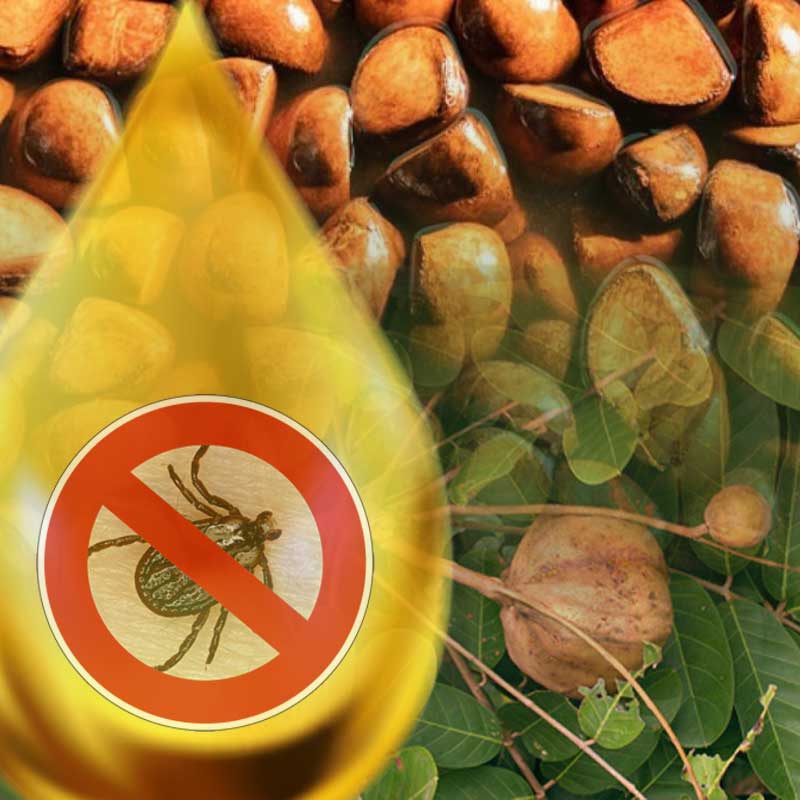Wanted: A natural tick remedy for the dog – does andiroba oil help against ticks?
What are the natural remedies against ticks? I have done a lot of research, looking for probably the best, natural tick repellent for dogs and humans.
Yes, it should also protect me from the sucking beasts, scare them away, drive them away and repel them before they even bite. Ok, actually they bite, it is more correctly a tick bite than a tick bite, because the parasites sting with their stinging proboscis into the tissue, which they cut open with their scissor-like mouth tool beforehand. Then they suck the coveted meal, the blood of dogs, cats and other animals and, of course, us humans.
Andiroba oil to not let the ticks get to me and my dog in the first place and at the same time a really good grooming oil, that’s worth a closer look. You can find a general article about the caring and protective andiroba oil here 👉 Andiroba oil – The effect of the precious oil from the Amazon
But slowly, how did I get into this andiroba oil in the first place?
It started with the “hype” about coconut oil, which I consider a good ingredient as well.
A lot was reported about the effectiveness of coconut oil against ticks, even a promising study about the contained lauric acid as a tick repellent, as a so-called tick repellent, that is, an agent that has a scaring away effect on the ticks. The Applied Zoology/Ecology working group at the FU Berlin had taken up this topic.
Coconut oil against ticks thus, internally, externally, coconut oil the all-rounder. For me, this was too little, or rather, already too much of the coconut oil “hype”. There are many positive reports about coconut oil, not only when it comes to repel ticks. It would be just perfect, whether for cooking, for skin care, as a superfood or even as a natural tick repellent – you get it in every supermarket and discount store now in organic quality.
I had searched further and found the promising substance Margosa extract as protection against ticks – the article is linked. It quickly occurred to me to combine coconut oil, as itself already protective carrier substance, with Margosa extract to get the optimal tick protection. But I was not the only one and so suitable, natural anti tick products for dogs and animals were quickly found.
These products based on natural substances work and act against ticks, or say now correctly these means can protect against ticks. For everyone here obviously makes his own experience as it turns out, if you search the Internet for it to find answers based on testimonials.
Perhaps the ticks are regionally too different to be able to generally rely on a means – only the biologists can answer that.
Anyway, during my research I then still came the substance geraniol as a tick repellent for dogs under the wings, I linked the article again. I liked that, not quite as good as the Margosa extract, but a good substance as a possible component when it comes to the topic of ticks or tick repellent. But of course, even here there were already clever minds and I could pick up the corresponding products right away.
Until I finally came across Andiroba oil and I was fascinated and enthusiastic. Not necessarily because Andiroba oil could now be the strongest natural remedy against ticks, no, rather because of its overall properties. Quasi:
“what coconut oil promises, andiroba oil can really keep”
I still like margosa extract the best, from a perceived strength and effect against ticks, but the application should already be well considered. Because in our latitudes we simply do not have the practical experience – of generations of indigenous people – with these natural remedies of other continents.
A rich, nourishing oil, almost rather preferred for cosmetic applications so far (eg cellulite treatment) but apparently super protection against ticks and other insects which is easy and unproblematic to apply.
Apparently Andirobaöl slows down the appetite of mosquitoes (Nematocera, in Austria also called Gelsen).
Does this effect also work on ticks and other vermin?
A study from the UNESP-Universidade Estadual Paulista, Instituto de Biociências, Departamento de Biologia can be found here:
It can be assumed that Andiroba oil has a toxic effect on the neuronal functions of ticks, which is why it can be recommended as an alternative method for the control of ticks.
Also other ectoparasites (ticks, fleas, lice, mites, …) for example, the cat’s hair louse (Felicola subrostratus) should be made by Andiroba Oil the finish:
So if Andiroba oil can now provide good protection against ticks and other vermin, is it also suitable for dogs and cats?
In my research on Andiroba I came across of course on Brazil and there it is probably used by the indigenous natives for wounds, ulcers and insect bites in dogs for ages. In Brazilian veterinary medicine, andiroba oil is used for infestations of domestic cats with ear mites. It seems to me to be a very safe oil with a broad spectrum of activity.
Please don’t get me wrong, I am not a scientist and do not conduct scientific studies myself. They are good and important, no question, if there were not already so much shenanigans going on with them. A separate topic, a long one. Analytical thinking, scientific power of observation and a good common sense to combine – each of us can form his own opinion here.
The studies and aboriginal lore cited may not be enough to be scientifically recognized in the EU or to gain regulatory approval as a proven effective remedy against ticks or other animals and pets.
We are all concerned with having alternatives to pharmaceutical products available that are proven to work and will always have their uses, but in everyday use the relationship to undesirable side effects should not be ignored.
A veterinarian can certainly help here, as a respected veterinarian explained and suggested to me long ago. One should always look at the concrete case.






